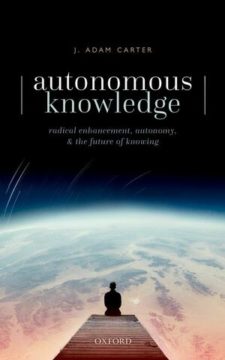Chris Tweedt at Notre Dame Philosophical Reviews:
 Technological advances such as Elon Musk’s Neuralink device are meant to be implanted in people’s skulls to interface their brain with powerful computers via the internet. Neuralink’s device will be designed to bring information to subjects’ minds and, possibly, to help subjects acquire skills. If the device works as intended, we will be able to acquire information via a device that is not a natural part of us. Will the acquisition of this information give us knowledge? Will we really know how to do whatever it is that Neuralink’s device assists us in doing? How we answer these questions is important. Knowledge is, arguably, an important human achievement, and if Neuralink’s device (or some other technological assistance) makes it so that we acquire information without knowing, or if it makes it so we do not know how to do what we do as a result of the technological assistance, then we have thereby reduced our ability to succeed in ways important to our humanity. Further, knowledge is arguably required for moral action. Performing a charitable act in full knowledge (and knowing how to perform the act) is more praiseworthy than performing the act in ignorance. If, however, our reliance on new technology diminishes our ability to act knowledgably, then we are less praiseworthy for having relied on that technology.
Technological advances such as Elon Musk’s Neuralink device are meant to be implanted in people’s skulls to interface their brain with powerful computers via the internet. Neuralink’s device will be designed to bring information to subjects’ minds and, possibly, to help subjects acquire skills. If the device works as intended, we will be able to acquire information via a device that is not a natural part of us. Will the acquisition of this information give us knowledge? Will we really know how to do whatever it is that Neuralink’s device assists us in doing? How we answer these questions is important. Knowledge is, arguably, an important human achievement, and if Neuralink’s device (or some other technological assistance) makes it so that we acquire information without knowing, or if it makes it so we do not know how to do what we do as a result of the technological assistance, then we have thereby reduced our ability to succeed in ways important to our humanity. Further, knowledge is arguably required for moral action. Performing a charitable act in full knowledge (and knowing how to perform the act) is more praiseworthy than performing the act in ignorance. If, however, our reliance on new technology diminishes our ability to act knowledgably, then we are less praiseworthy for having relied on that technology.
more here.
